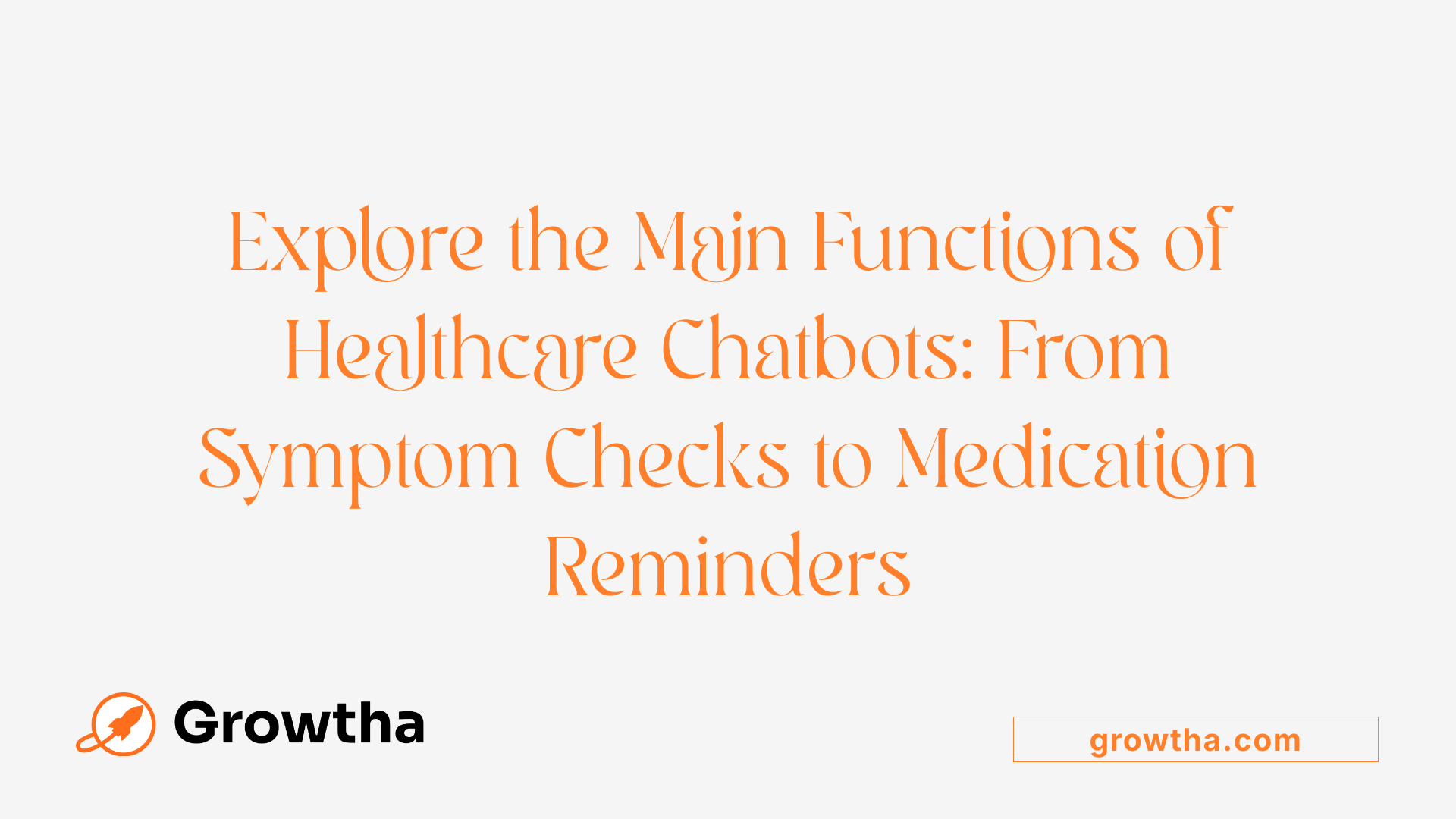The Role of Chatbots in Enhancing Patient Engagement
Transforming Healthcare: How Chatbots Elevate Patient Engagement


The Role of Chatbots in Enhancing Patient Engagement
Unlocking the Potential of AI in Patient-Centered Care
The integration of artificial intelligence (AI) and chatbots into healthcare systems is revolutionizing the way patients and providers communicate, deliver, and manage care. As digital health communication accelerates, these virtual health assistants are becoming critical tools in enhancing patient engagement, improving health outcomes, and optimizing operational efficiency. This article explores the technological advancements, applications, benefits, challenges, and future trends of chatbots in healthcare, highlighting their vital role in fostering a more accessible, efficient, and personalized healthcare environment.
The Evolution and Functionality of Healthcare Chatbots

What is the role of chatbots in healthcare?
Healthcare chatbots, also known as virtual health assistants, are AI-powered tools that facilitate self-service options for patients. They serve as an accessible interface for symptom checking, appointment scheduling, bill payments, and live chat with nurses or other healthcare professionals. These digital assistants are integrated into healthcare systems to enhance communication, streamline administrative processes, and provide around-the-clock support.
A prominent example is Clare, a virtual health assistant implemented by OSF HealthCare in 2019. Clare provides patients with 24/7 access to essential services and acts as a single point of contact. This continuous availability allows Clare to handle a substantial portion of patient interactions outside traditional business hours, demonstrating its role in improving healthcare accessibility.
What are the main functionalities of healthcare chatbots?
Healthcare chatbots perform a wide range of functions designed to enhance patient experience and operational efficiency:
- Symptom checking and triage
- Appointment scheduling and rescheduling
- Bill payments and insurance inquiries
- Connecting patients to live nurses or healthcare providers
- Providing educational information about symptoms, treatments, and wellness tips
- Medication reminders and management
- Mental health support and lifestyle coaching
With the advancement of AI technologies such as Natural Language Processing and Machine Learning, these chatbots can understand complex patient queries, simulate human conversations, and deliver personalized responses.
How do chatbots improve patient interaction and support?
Implementing chatbots offers many benefits for patients and healthcare providers. They enable instant, 24/7 access to healthcare information and services, which increases patient engagement and satisfaction. For example, chatbots can assist in building trust by providing reliable medical advice, guiding patients through symptom management, and answering common questions efficiently.
Moreover, chatbots help streamline administrative burdens. Tasks such as appointment bookings, billing, and insurance navigation are automated, reducing wait times and freeing up healthcare staff to focus on more complex clinical cases. In doing so, they enhance the overall quality of care while reducing operational costs.
In addition, chatbots assist vulnerable populations—such as those in rural or underserved areas—by providing continuous access to health information and guidance when clinics are unavailable. This accessibility supports health equity and contributes to better health outcomes.
What are some common applications and use cases?
Chatbots are versatile tools supporting numerous healthcare functions:
| Application Area | Use Cases | Additional Details |
|---|---|---|
| Appointment Management | Book, reschedule, or cancel appointments | Integrating with hospital systems reduces no-shows |
| Symptom Triage | Initial assessment of symptoms to determine urgency | Early guidance like COVID-19 screening |
| Medication Management | Reminders and medication info | Improving adherence and reducing errors |
| Patient Education | Providing evidence-based health info | Accessible language for patient understanding |
| Mental Health Support | Offering coping strategies and referrals | Chatbots like ChatPal aid mental wellness |
| Chronic Disease Monitoring | Real-time monitoring and alerts | Supporting ongoing management |
These tools promote engagement, operational savings, and better health outcomes.
The Impact of Chatbots on Healthcare Operations and Costs

What benefits do chatbots bring to healthcare operations and costs?
Healthcare chatbots significantly improve operational efficiency by automating routine and administrative tasks such as appointment scheduling, billing, and responding to common patient inquiries. This automation reduces the workload on healthcare staff, enabling them to focus on more complex, value-added activities, which in turn streamlines overall healthcare delivery.
A notable example is OSF HealthCare’s virtual health assistant Clare, launched in 2019. Clare provides 24/7 access to essential services and acts as a single point of contact for patients. Its implementation resulted in a savings of $2.4 million during its first year, achieved through increased revenue and the diversion of calls away from traditional contact centers. Such savings arise from automating intake processes and reducing the need for additional staff during off-hours.
Broadly, the adoption of AI-powered chatbots is projected to save the global healthcare system approximately USD 3.6 billion by 2025. These efficiencies allow healthcare providers to optimize resource utilization, decrease operational costs, and improve patient management. As these virtual assistants handle tasks like scheduling, reminders, and initial symptom analysis, staff can devote more time to delivering direct patient care, ultimately enhancing service quality and reducing waiting times.
How do chatbots enhance accessibility and equity in healthcare?
Chatbots also play a pivotal role in making healthcare more accessible and equitable. By providing round-the-clock support, they reach populations who might otherwise face barriers to in-person visits, such as those in rural or underserved communities.
For instance, patients can access reliable, immediate information about symptoms, treatments, and health management through chatbots at any time, reducing reliance on physical clinics and alleviating geographic or socioeconomic disparities. These tools can be integrated with wearable devices, telehealth platforms, and electronic health records to deliver personalized care tailored to individual needs.
This continuous, on-demand communication helps bridge gaps in healthcare access, ensuring timely intervention and health education regardless of a patient's location. Such inclusivity fosters greater participation in health management, supports health equity, and promotes better health outcomes for diverse populations.
| Aspect | Benefit | Further Details |
|---|---|---|
| Administrative Tasks | Efficiency | Automates scheduling, billing, inquiries |
| Cost Savings | Economical | Reduces staffing needs, operational costs |
| Patient Access | Inclusivity | 24/7 support for remote and vulnerable populations |
| Personalization | Effectiveness | Integration with health records and wearables |
| Economic Impact | Savings | Estimated global reduction of USD 3.6 billion by 2025 |
AI-driven chatbots are transforming healthcare delivery by enabling smarter, faster, and more inclusive services. They serve not only as tools for operational support but also as catalysts for addressing disparities and promoting equitable health access worldwide.
Future Prospects and Advances in Healthcare Chatbots
What are the future trends in healthcare chatbot technology?
The landscape of healthcare chatbot technology is poised for significant advancements fueled by emerging innovations. One prominent direction is the integration of voice AI and multimodal communication systems. These enhancements will enable more natural, intuitive interactions—patients could speak, see, or interact through multiple mediums seamlessly, making health support more accessible.
Generative AI models are expected to revolutionize how chatbots learn and adapt. These models will allow virtual assistants to continuously analyze vast amounts of patient data, personalizing responses, predicting health risks, and supporting early diagnosis. Deeper integration with electronic health records (EHRs), wearable devices, and real-time health monitors will facilitate proactive, data-driven care.
Improvements in AI will also include summarizing complex medical histories for clinicians, assisting in remote patient monitoring, and providing clinicians with necessary insights without disrupting workflows.
However, these technological strides come with challenges. Ensuring data privacy, mitigating algorithmic bias, and maintaining compliance with health regulations like HIPAA are critical to build trust and ensure safe deployment. As the technology evolves, balancing innovation with ethical considerations will remain paramount.
How can AI-driven chatbots contribute to preventative healthcare and health management?
AI-driven healthcare chatbots will be central to the movement towards proactive health management. By continuously analyzing data collected from wearable health devices, digital health records, and patient inputs, these chatbots can identify early warning signs of health issues before symptoms become severe.
They can promote healthy behaviors through personalized interventions—setting goals, providing motivational feedback, and offering educational content tailored to individual risk factors. For example, chatbots can support smoking cessation, weight management, physical activity, and dietary improvements.
Additionally, chatbots facilitate ongoing health engagement by giving on-demand advice and reminders. This constant support encourages adherence to medication, lifestyle modifications, and preventive screenings.
Early detection enabled by AI can significantly reduce complications, lower healthcare costs, and improve quality of life. By guiding patients to seek timely care and maintain healthy habits, AI-powered chatbots help shift healthcare focus from treatment to prevention, addressing chronic disease risks and promoting healthier populations.
Ethical and Regulatory Considerations in Using Chatbots for Healthcare
What are the key ethical and regulatory considerations for healthcare chatbots?
Healthcare chatbots, or virtual health assistants, are becoming integral to modern medical systems, offering benefits like improved patient engagement and operational efficiencies. However, their deployment introduces important ethical and regulatory questions that must be addressed to ensure safe, fair, and trustworthy use.
A primary concern involves safeguarding patient data privacy and security. As these chatbots collect sensitive health information—ranging from symptoms and medical histories to personal identifiers—they must implement robust encryption and security measures. Regulations such as the Health Insurance Portability and Accountability Act (HIPAA) in the U.S. and the General Data Protection Regulation (GDPR) in Europe set strict standards for data privacy, requiring healthcare providers to protect patient information against breaches and misuse.
Beyond security, transparency is vital. Patients and healthcare providers need to understand how AI algorithms process data and make decisions. This includes ensuring explainability, so that outcomes and recommendations made by the chatbot can be clearly justified. Transparent AI fosters trust and helps prevent misunderstandings or misuse of the technology.
Another significant ethical challenge is addressing biases within AI systems. If chatbots are trained on unrepresentative data, they may inadvertently perpetuate disparities, providing less effective support for certain populations based on race, gender, or socioeconomic status. Striving for fairness and inclusivity involves rigorous testing, ongoing monitoring, and refinement of algorithms to promote equitable healthcare outcomes.
Ensuring fairness and accuracy also requires that AI models undergo regular validation and supervision. Continual oversight helps detect unintended biases, errors, or drifts in performance, thereby safeguarding patient safety.
Regulatory approval processes are crucial. Healthcare authorities are increasingly establishing guidelines and certification standards for AI tools. Chatbots must demonstrate efficacy, safety, and compliance to gain approval for widespread clinical use. This might involve clinical trials, ethical reviews, and certification procedures.
In summary, integrating chatbots into healthcare demands a careful balance of innovation and responsibility. Ensuring data privacy, transparency, fairness, and regulatory compliance protects patient rights and supports trustworthy AI-driven healthcare delivery. As the technology advances, particularly with future iterations incorporating generative AI, adherence to these considerations remains fundamental to harnessing AI’s full potential responsibly.
Charting the Path Forward in Digital Healthcare
As AI chatbots continue to evolve, their role in enhancing patient engagement will expand, driven by technological innovations and a clearer understanding of how to ethically and effectively deploy these tools. Their ability to provide personalized, accessible, and efficient care is transforming traditional healthcare models into patient-centric ecosystems. Addressing the challenges of data privacy, algorithmic bias, and integration will be crucial to unlocking their full potential. Ultimately, leveraging AI-powered chatbots in healthcare promises a future where patient engagement, health equity, and clinical outcomes are markedly improved, ensuring a more responsive and inclusive healthcare landscape for all.
References
- How chatbots are enhancing patient care
- AI Chatbots in Healthcare: Use Cases, Examples, Benefits
- Artificial Intelligence–Based Chatbots for Promoting Health ...
- The Role of AI-Driven Chatbots in Enhancing Patient ...
- View of Exploring the Role of Chatbots in Enhancing ...
- How to Use AI & Chatbots for Better Patient Engagement
- Future of Chatbots in Healthcare
- AI chatbots boost patient engagement and reduce clinician ...
- Patient Engagement Chatbot [6 Real-World Implementations]
- the transformative role of AI-powered hybrid chatbots ...







